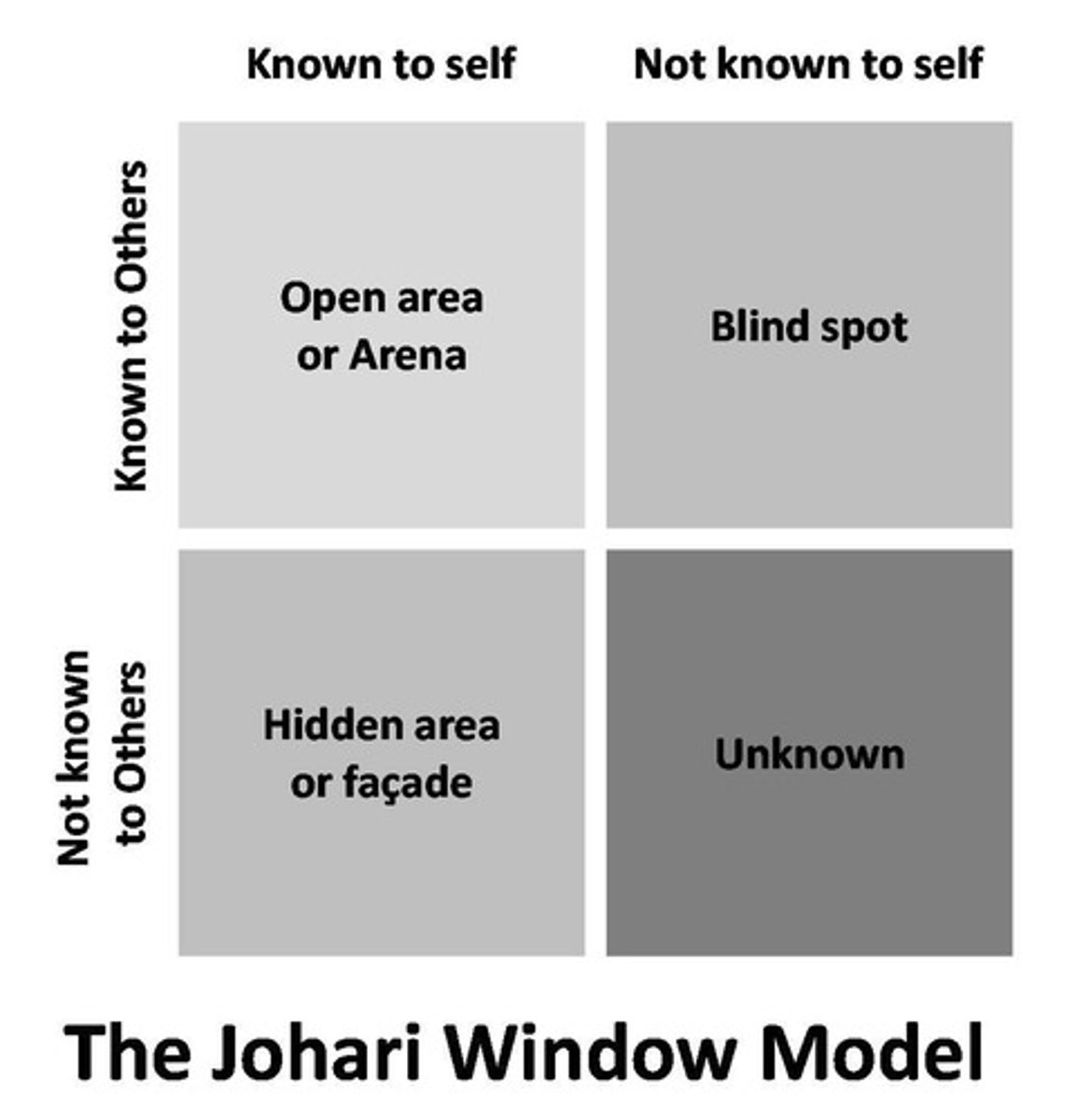Understanding Self and Public Speaking Anxiety
1/21
There's no tags or description
Looks like no tags are added yet.
Name | Mastery | Learn | Test | Matching | Spaced |
|---|
No study sessions yet.
22 Terms
What is the significance of self-view in public speaking?
How you view yourself is critical for successfully communicating a message.
How is 'self' defined according to the Oxford dictionary?
Self is a person's essential being that distinguishes them from others, especially considered as the object of introspection or reflective action.
What is self-concept?
Self-concept is a relatively stable set of perceptions you hold of yourself, reflecting physical characteristics, emotional states, talents, skills, interests, and values.
What does the concept of reflected appraisal suggest?
It posits that we view ourselves based on how other people see us; for example, if others see you as a good leader, you will believe and act as such.
What is social comparison in the context of self-perception?
Social comparison involves evaluating ourselves based on how we compare to others, determining if we are superior or inferior in various traits.
What is self-attribution?
Self-attribution is regarding a quality or trait to oneself, such as believing one is not a good public speaker, which can lead to self-defeating strategies.
How do self-values relate to global self-esteem?
Self-values determine what is important to an individual and can influence global self-esteem; valuing traits like likability can enhance self-esteem.
What is the Johari Window model?
The Johari Window model, created by Joseph Luft and Harrington Ingham, illustrates self-awareness as a function of different selves through four quadrants.

What is public speaking apprehension?
Public speaking apprehension is a type of communication anxiety characterized by fear experienced when anticipating or speaking to an audience.
What are the eight factors contributing to oral communication anxiety according to Del Villar?
The factors are expectation, training and experience, audience, self-worth, rejection, verbal fluency, preparation, and previous unpleasant experiences.
What are physiological manifestations of stage fright?
Physiological manifestations include clammy hands, weak knees, dry mouth, trembling voice, and butterflies in the stomach.
What are psychological manifestations of stage fright?
Psychological manifestations include mental blocks, vocal hesitation, and nonfluency.
What was the focus of Deinzer's experiment with novice skydivers?
Deinzer aimed to discover how the body responds to incredible stressors and whether people habituate to the rush of skydiving.
What did Rohleder's experiment compare?
Rohleder's experiment compared the stress responses of ballroom dancers on practice days and contest days to those of novice skydivers.
What was a key finding from Rohleder's experiment regarding stress?
The stress response from ballroom dancing was found to be as strong as that from a second skydive jump.
What is the main difference between skydiving and ballroom dancing according to the notes?
The main difference is not the physical environment or jeopardy to life, but the psychological environment.
What advice does Dale Carnegie give for managing public speaking anxiety?
Carnegie suggests realizing that tension is normal, focusing on ideas rather than presentation, establishing eye contact, breathing deeply, and practicing public speaking often.
What is the importance of preparation in public speaking?
Only the prepared speaker deserves to be confident, as preparation helps manage anxiety and enhances delivery.
What role does self-awareness play in public speaking?
Self-awareness helps individuals understand their strengths and weaknesses, which can improve their public speaking skills.
How can one develop confidence in public speaking?
Confidence can be developed by practicing, preparing thoroughly, and managing anxiety through techniques like deep breathing.
What is the relationship between self-esteem and self-values?
Self-esteem is influenced by self-values; valuing positive traits can enhance one's overall self-esteem.
What does Aristotle suggest about self-knowledge?
Aristotle states that knowing yourself is the beginning of all wisdom.